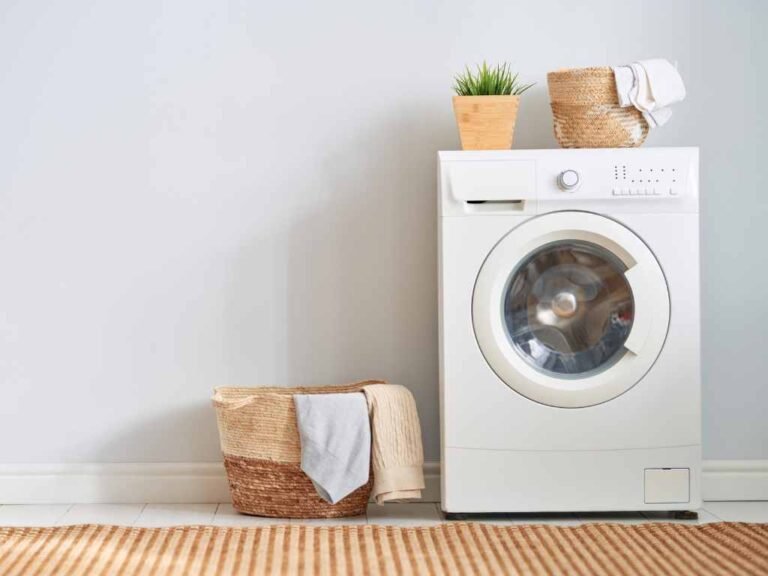How to Handle Dorm Room Inspections

College dorm room inspections are a routine part of college life, designed to ensure that living spaces are safe, clean, and well-maintained. With the right preparation and mindset, handling dorm room inspections can be a straightforward and stress-free experience.
In this guide, we’ll explore how to handle college dorm room inspections effectively. From understanding the purpose of inspections and preparing your room to maintaining cleanliness and addressing violations, these tips will help you navigate inspections with confidence and ease.
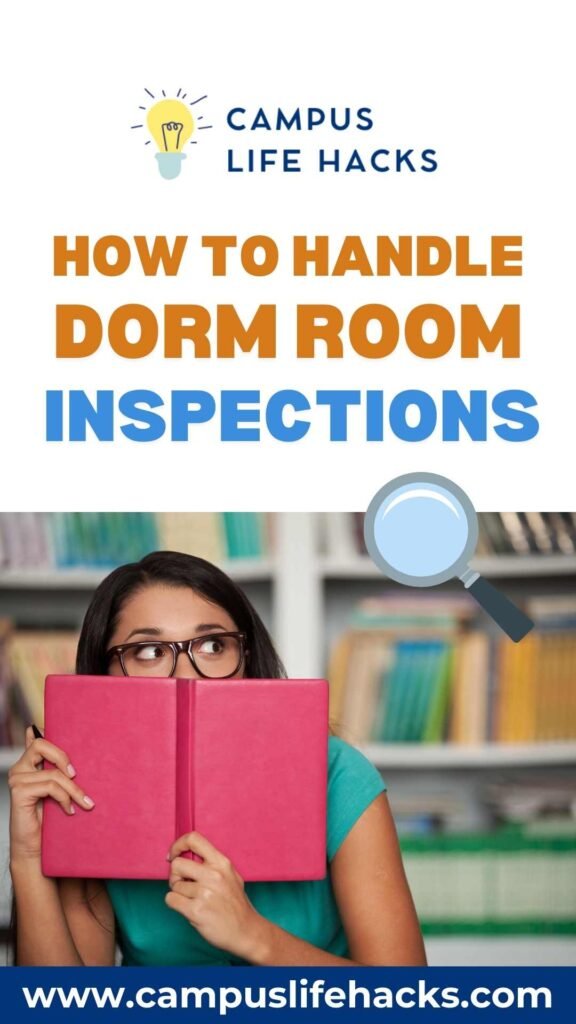
Table of Contents
- Introduction
- Understanding Dorm Room Inspections
- Preparation is Key
- Cleanliness and Organization
- Safety and Maintenance Checks
- What to Do During the Inspection
- Common Mistakes to Avoid
- Handling Violations and Follow-Up
- Final Tips for Stress-Free Inspections
- Related Articles
Understanding Dorm Room Inspections
Before diving into preparation tips, it’s important to understand the purpose and process of dorm room inspections. Here’s what you need to know.

1. Purpose of Dorm Room Inspections
- Safety and Health: Dorm room inspections are primarily conducted to ensure the safety and health of students. Inspectors check for fire hazards, cleanliness, and maintenance issues that could pose risks to residents.
- Policy Compliance: Inspections help ensure that students comply with dorm policies, such as restrictions on prohibited items (e.g., candles, space heaters) and rules about room cleanliness and organization.
2. When Inspections Occur
- Scheduled Inspections: Many dorms conduct scheduled inspections at regular intervals, such as once per semester or before major breaks. These inspections are usually announced in advance, giving students time to prepare.
- Unscheduled Inspections: Some inspections may be unscheduled or random, conducted to ensure ongoing compliance with dorm policies. While these inspections may not be announced, they are often less formal and focus on obvious safety issues.
3. Who Conducts the Inspections
- Resident Advisors (RAs): In many dorms, Resident Advisors (RAs) are responsible for conducting inspections. They are trained to look for safety hazards, cleanliness, and policy compliance.
- Dorm Staff or Maintenance Personnel: In some cases, dorm staff or maintenance personnel may conduct inspections, especially when checking for maintenance issues or repairs that need attention.
Pro Tip:
Review your dorm’s handbook or guidelines to familiarize yourself with the inspection process and what is expected of you. Knowing what to expect helps reduce anxiety and ensures you’re prepared.
Preparation is Key
Preparing for dorm room inspections in advance can save you time and stress. Here’s how to get ready for inspections.

1. Know the Rules
- Review Dorm Policies: Familiarize yourself with your dorm’s rules and policies regarding room cleanliness, prohibited items, and safety regulations. Knowing the rules helps you avoid violations and ensures that your room meets inspection standards.
- Ask Questions: If you’re unsure about specific rules or policies, don’t hesitate to ask your RA or dorm staff for clarification. Understanding the expectations helps you prepare more effectively.
2. Stay Organized
- Create a Checklist: Create a checklist of tasks to complete before inspections, such as cleaning, organizing, and checking for prohibited items. A checklist helps you stay organized and ensures that you don’t overlook important tasks.
- Set Reminders: Set reminders on your phone or calendar for upcoming inspections. This gives you enough time to prepare and avoid last-minute stress.
3. Regular Maintenance
- Keep Up with Cleaning: Make cleaning a regular part of your routine, rather than waiting until inspections are announced. Regular maintenance keeps your room tidy and reduces the amount of work needed when inspections are scheduled.
- Address Issues Early: If you notice any maintenance issues, such as leaky faucets, broken fixtures, or electrical problems, report them to dorm staff promptly. Addressing issues early prevents them from becoming bigger problems during inspections.
Pro Tip:
Involve your roommate in the preparation process. Collaborate on cleaning tasks and make sure both of you are aware of the inspection schedule and dorm policies. Working together ensures that the entire room is inspection-ready.
Cleanliness and Organization
Maintaining a clean and organized room is essential for passing inspections. Here’s how to keep your dorm room spotless.
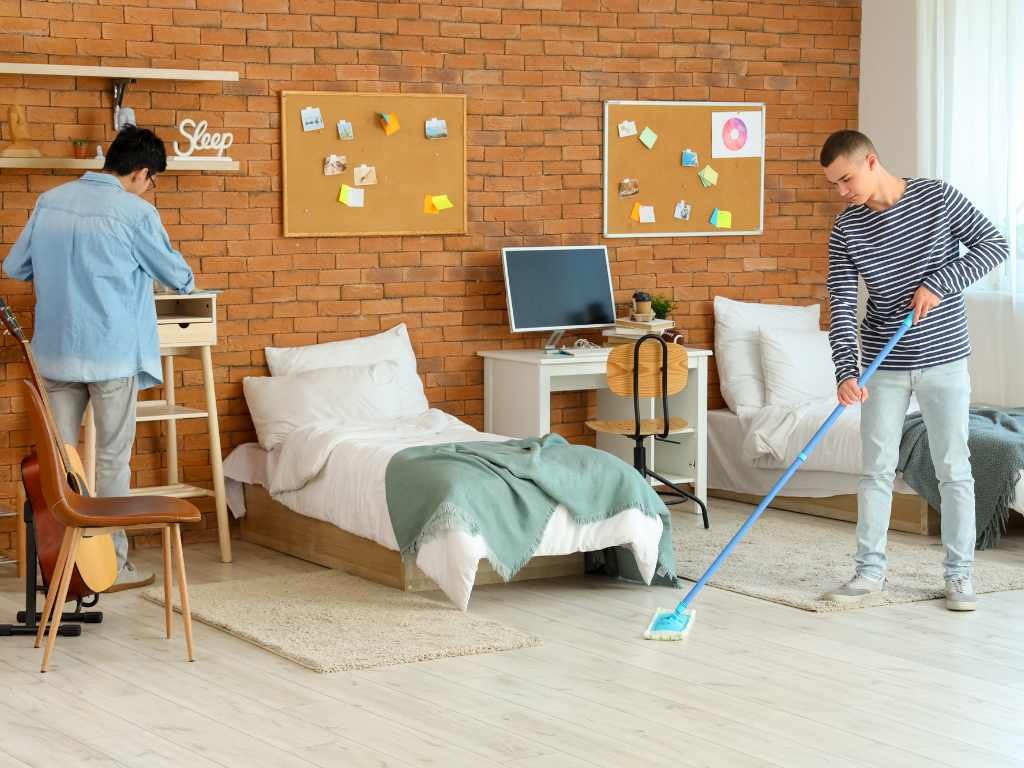
1. Tidy Up Regularly
- Daily Cleaning Habits: Develop daily cleaning habits, such as making your bed, wiping down surfaces, and putting away personal items. Keeping your room tidy on a daily basis makes it easier to maintain cleanliness.
- Declutter Often: Regularly declutter your room by getting rid of items you no longer need or use. A clutter-free space is easier to clean and makes a positive impression during inspections.
2. Deep Clean Before Inspections
- Focus on Key Areas: Before inspections, focus on deep cleaning key areas of your room, such as the floors, windows, and bathroom (if applicable). Vacuum carpets, mop floors, and clean mirrors and windows for a fresh, clean look.
- Clean Common Areas: If you share common areas with roommates, such as the bathroom or kitchen, make sure these areas are cleaned and organized. Coordinate cleaning tasks with your roommates to ensure that all shared spaces are inspection-ready.
3. Organize Personal Belongings
- Use Storage Solutions: Use storage bins, shelves, and organizers to keep your belongings neat and organized. Label storage containers to make it easy to find items and keep your room clutter-free.
- Keep Surfaces Clear: Avoid overcrowding surfaces like desks, dressers, and tables with too many items. Keep surfaces clear and organized to create a clean and tidy appearance.
Pro Tip:
Use eco-friendly cleaning products that are safe and effective for dorm use. Natural cleaning products are better for your health and the environment, and they help keep your room smelling fresh and clean.
Safety and Maintenance Checks
Inspections often include checks for safety hazards and maintenance issues. Here’s how to ensure your room is safe and compliant.
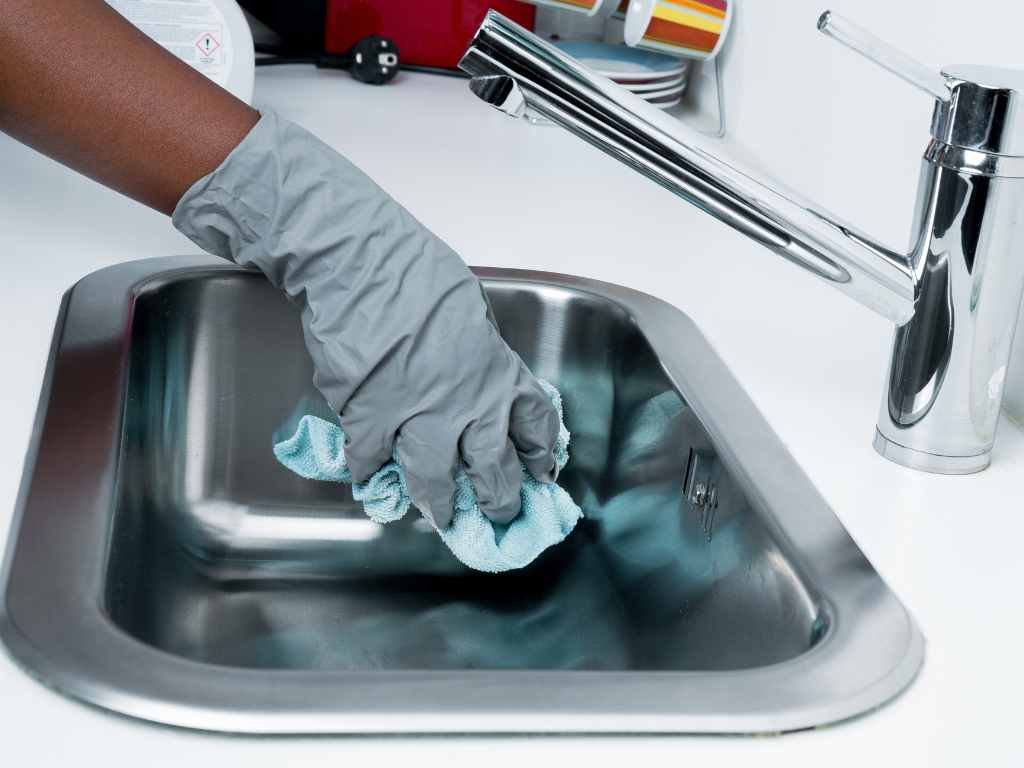
1. Check for Prohibited Items
- Know What’s Prohibited: Familiarize yourself with the list of prohibited items in your dorm, such as candles, space heaters, and certain cooking appliances. Remove any prohibited items from your room before inspections to avoid violations.
- Store Items Safely: If you have items that are allowed but need to be stored safely (e.g., cleaning supplies, electrical cords), make sure they are stored properly and do not pose a safety risk.
2. Inspect Electrical and Fire Safety
- Avoid Overloading Outlets: Do not overload electrical outlets with too many devices or power strips. Use surge protectors and avoid daisy-chaining power strips to reduce the risk of electrical fires.
- Check Smoke Detectors: Ensure that smoke detectors in your room are functioning properly. If you notice any issues with smoke detectors, such as low battery warnings or malfunctioning units, report them to dorm staff immediately.
3. Report Maintenance Issues
- Identify Problems Early: Regularly inspect your room for maintenance issues, such as leaky faucets, broken lights, or damaged furniture. Report any problems to dorm staff as soon as possible to ensure they are addressed before inspections.
- Document Issues: Keep a record of any maintenance issues you report, including the date and nature of the problem. This documentation can be helpful if follow-up is needed or if issues arise during inspections.
Pro Tip:
Conduct your own mini-inspections regularly to check for safety and maintenance issues. Being proactive helps you address problems early and ensures that your room meets inspection standards.
What to Do During the Inspection
Knowing what to expect during the inspection and how to conduct yourself can help make the process smoother. Here’s how to handle the inspection itself.
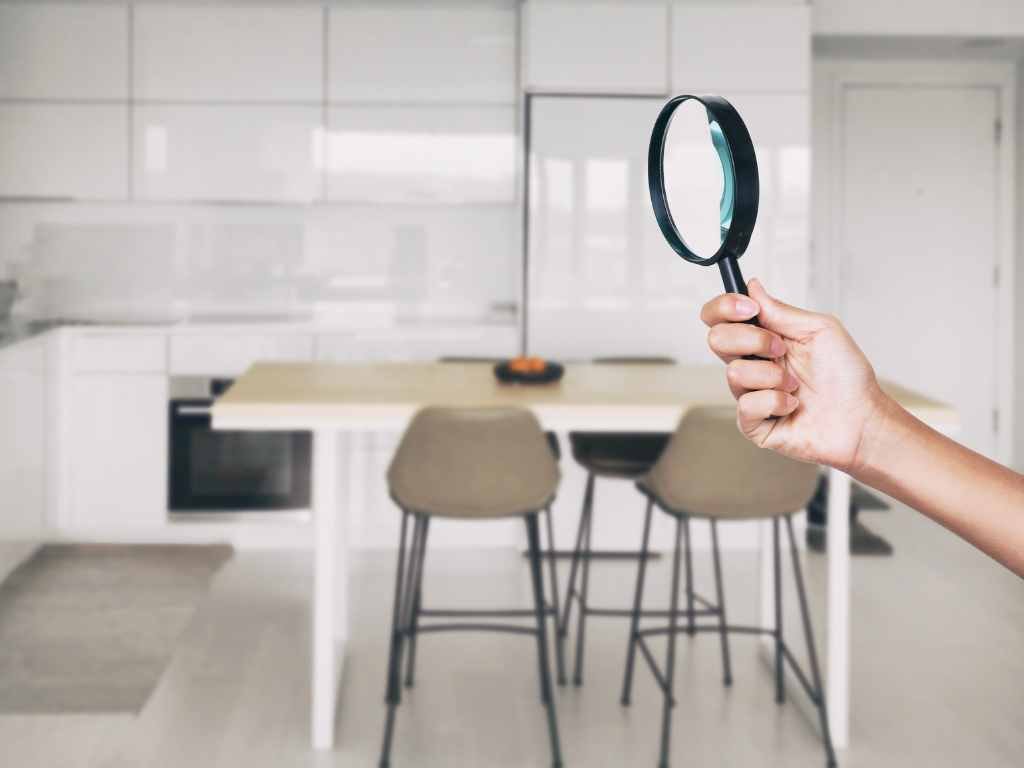
1. Be Present if Possible
- Stay in the Room: If possible, be present in your college dorm room during the inspection. This allows you to answer any questions, provide access to all areas of the room, and address any concerns the inspector may have.
- Inform Your Roommate: If you have a roommate, coordinate with them to ensure that at least one of you is present during the inspection. Communication and cooperation make the inspection process more efficient.
2. Be Cooperative and Courteous
- Show Respect: Be polite and courteous to the inspector. Follow their instructions, answer their questions honestly, and show them any areas of the room they need to inspect.
- Stay Calm: Stay calm and composed during the inspection. If the inspector points out any issues or concerns, take note of them and address them promptly.
3. Ask Questions if Needed
- Seek Clarification: If you have any questions or concerns about the inspection process or the inspector’s findings, don’t hesitate to ask for clarification. Understanding what is expected and why certain issues are raised helps you comply and make necessary adjustments.
- Take Notes: Take notes of any feedback or suggestions the inspector provides. This will help you remember what needs to be addressed and ensures that you can take corrective action if required.
Pro Tip:
Prepare a list of any maintenance issues or concerns you’ve identified in your room to share with the inspector. This proactive approach shows that you are responsible and committed to maintaining a safe and compliant living space.
Common Mistakes to Avoid
To ensure a smooth inspection process, avoid these common mistakes that can lead to violations or negative feedback.

1. Ignoring Inspection Notices
- Pay Attention to Notices: Don’t ignore inspection notices or emails from dorm staff. These notices provide important information about the date and time of the inspection, as well as any specific instructions for preparation.
- Mark Your Calendar: As soon as you receive an inspection notice, mark the date on your calendar and set reminders. This helps you stay on top of preparations and ensures that you’re ready on inspection day.
2. Procrastinating on Cleaning
- Avoid Last-Minute Cleaning: Waiting until the last minute to clean your college dorm room prior to an inspection can lead to a rushed and incomplete job. Start cleaning and organizing your room well in advance to avoid stress and ensure that every area is properly addressed.
- Consistent Effort: Make cleaning and organization a regular habit, rather than something you do only before inspections. Consistent effort keeps your room in good condition and makes inspections less daunting.
3. Overlooking Small Details
- Check Every Area: Don’t overlook small details, such as dusting surfaces, cleaning windows, and organizing drawers. Inspectors often look at the overall cleanliness and organization of the room, so attention to detail matters.
- Clean Common Spaces: If you share common spaces, such as a bathroom or kitchen, don’t neglect these areas. Make sure they are clean, organized, and free of clutter to pass inspection.
Pro Tip:
Create a pre-inspection checklist that includes tasks like vacuuming, dusting, organizing, and checking for prohibited items. Use the checklist to guide your preparations and ensure that every aspect of your room is inspection-ready.
Handling Violations and Follow-Up
If you receive feedback or violations during an inspection, it’s important to handle them appropriately. Here’s how to address violations and follow-up effectively.

1. Take Feedback Seriously
- Listen and Understand: If the inspector provides feedback or points out violations, listen carefully and seek to understand the issue. Acknowledge the feedback and ask for clarification if needed.
- Take Responsibility: Take responsibility for any violations and show a willingness to correct them. Avoid making excuses or arguing with the inspector, as this can escalate the situation.
2. Correct Violations Promptly
- Address Issues Immediately: Take immediate action to correct any violations or issues identified during the inspection. Whether it’s removing prohibited items, fixing a maintenance problem, or improving cleanliness, prompt action demonstrates responsibility.
- Document Corrections: If you make corrections, document the changes you’ve made and inform dorm staff or the inspector. Providing evidence of compliance helps resolve the issue and prevents further action. Remember, college dorm room inspections aren’t just about you. They’re a necessary procedure for the well-being of the entire student body.
3. Follow-Up with Dorm Staff
- Communicate with RA or Staff: If you have questions or need assistance with correcting violations, reach out to your RA or dorm staff. They can provide guidance, support, and resources to help you address the issues.
- Request a Re-Inspection: If you’ve corrected violations and want to ensure that your room meets inspection standards, consider requesting a re-inspection. This shows your commitment to compliance and helps clear any outstanding issues.
Pro Tip:
Keep a record of any communications, actions, or corrections related to inspections. This documentation is useful for reference and helps you track your compliance efforts over time.
Final Tips for Stress-Free Inspections
Handling dorm room inspections doesn’t have to be stressful. By following these tips, you can ensure a smooth and successful inspection experience.

1. Stay Informed and Prepared
- Know the Schedule: Stay informed about the inspection schedule and any specific requirements. Being aware of what’s expected helps you prepare effectively and reduces anxiety.
- Prepare in Advance: Start preparing for inspections well in advance. Regular cleaning, organization, and maintenance keep your room in good condition and minimize last-minute stress.
2. Communicate with Roommates
- Coordinate Efforts: Work together with your roommates to prepare for inspections. Assign cleaning tasks, review dorm policies, and ensure that everyone is on the same page.
- Respect Each Other’s Space: Respect your roommates’ space and belongings during preparation. Clear communication and cooperation make the process smoother for everyone.
3. Stay Calm and Positive
- Stay Calm: Approach inspections with a calm and positive attitude. Remember that inspections are routine and meant to ensure a safe and comfortable living environment.
- Learn from Experience: Use each college dorm room inspection as a learning experience. Take note of feedback, make improvements, and continue to maintain a high standard of cleanliness and safety.
Pro Tip:
View inspections as an opportunity to create a better living environment for yourself and your roommates. By staying proactive, organized, and communicative, you can handle college dorm room inspections with confidence and ease.
Related Articles
Essential Dorm Room Checklist for Freshmen
How to Decorate a College Dorm on a Budget
Final Thoughts
College dorm room inspections are a routine part of college life, but they don’t have to be stressful.
By understanding the purpose of inspections, staying prepared, maintaining cleanliness, and addressing any issues promptly, you can handle inspections with confidence. Remember, inspections are meant to ensure a safe, clean, and enjoyable living environment for everyone. With these tips, you’ll be well-equipped to pass inspections and make the most of your college dorm experience.


